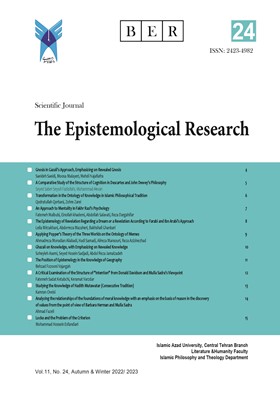-
-
List of Articles
-
Open Access Article
1 - Gnosis in Gazali’s Approach, Emphasizing on Revealed Gnosis
Saeideh Saeidi moosa malayeri Mehdi Najafiafra -
Open Access Article
2 - A Comparative Study of the Structure of Cognition in Descartes and John Dewey’s Philosophy
Seyed saber Seyedi fazlollahi Mohammad Akvan -
Open Access Article
3 - Transformation in the Ontology of Knowledge in Islamic Philosophical Tradition
Qodratullah Qorbani zohre zarei -
Open Access Article
4 - An Approach to Mentality in Fakhr Razi's Psychology
fatemeh malbubi einollah khademi abdollah salavati Reza Dargahifar -
Open Access Article
5 - The Epistemology of Revelation Regarding a Dream or a Revelation According to Farabi and Ibn Arabi’s Approach
Leila Mirzakhani Abdorreza Mazaheri bakhshali ghanbari -
Open Access Article
6 - Applying Popper's Theory of the Three Worlds on the Ontology of Memes
Ahmad reza Moradian Ali abadi Hadi Samadi Alireza Mansouri reza Azizinezhad -
Open Access Article
7 - Ghazali on Knowledge, with Emphasizing on Revealed Knowledge
Soheyleh Asemi Seyed Hosein Sadjadi Abdol Reza Jamalzadeh -
Open Access Article
8 - The Position of Epistemology in the Knowledge of Geography
behzad fozooni vajargah -
Open Access Article
9 - A Critical Examination of the Structure of "Intention" from Donald Davidson and Mulla Sadra’s Viewpoint
Fatemeh Sadat Ketabchi Keramat Varzdar -
Open Access Article
10 - Studying the Knowledge of Hadith Mutawatar (Consecutive Tradition)
kamran oveisi -
Open Access Article
11 - Analyzing the relationships of the foundations of moral knowledge with an emphasis on the basis of reason in the discovery of values From the point of view of Barbara Herman and Mulla Sadra
saeideh Hamledari Ahmad Fazeli -
Open Access Article
12 - Locke and the Problem of the Criterion
Mohammad Hosein Esfandiari
-
The rights to this website are owned by the Raimag Press Management System.
Copyright © 2021-2025







